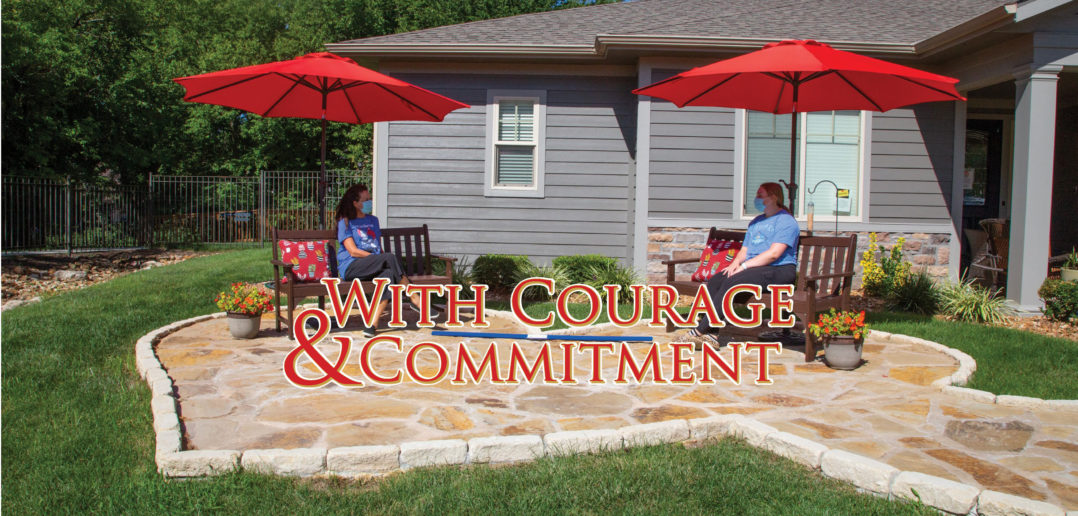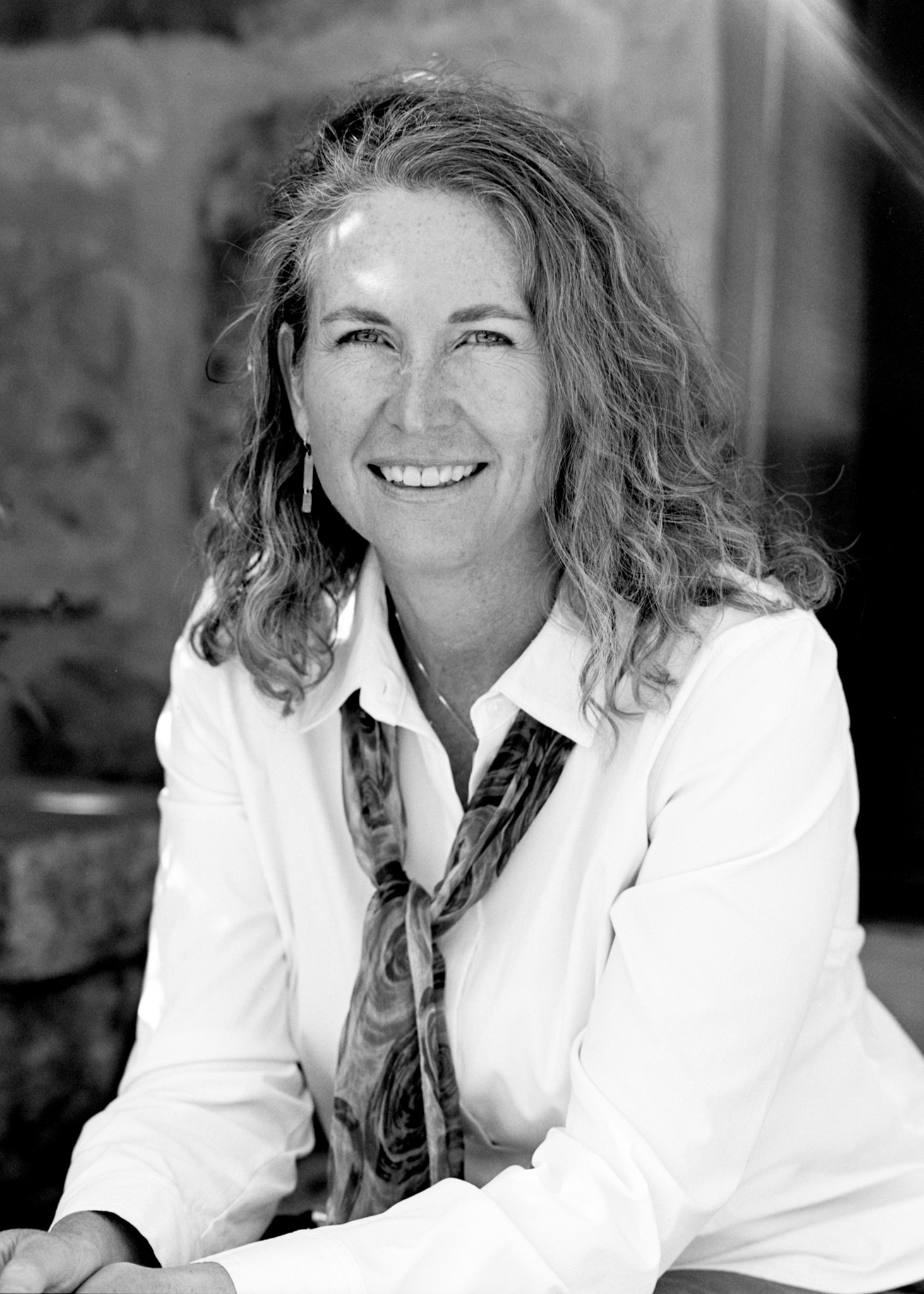Senior living employees play a vital role in the care and well-being of residents in senior housing and care facilities.
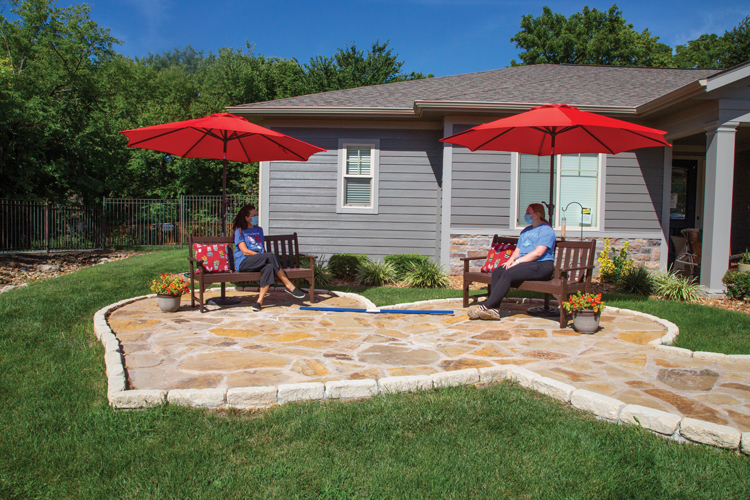
Sarah Randolph, Executive Director of Bridge Haven sits on a patio with a colleague while maintaining social distancing.
A lot’s changed at Lawrence Presbyterian Manor since March, when senior living facilities across the country curtailed visits, canceled activities and closed common spaces because of COVID-19. What’s stayed the same? The commitment employees feel toward keeping residents in its independent-living, memory-care and long-term and skilled-care facilities safe and healthy.
“These folks are my second family,” says Sharon Goger, who has worked as a dining services assistant at Lawrence Presbyterian Manor for 11 years. “I do this for the residents. I love my residents.”
Long-term care and senior housing providers employ more than 40,000 people in Kansas, according to the Kansas Health Care Association, and U.S. Bureau of Labor Statistics data shows the largest share of those are health-care professionals. Still, employees such as Goger, who otherwise support residents and their families, play similarly vital—if less visible—roles at every facility.
“There’s really been attention and focus put on the clinical side of workers, and rightfully so, but the people in dining, activities, maintenance and housekeeping get overlooked a bit,” says Curtis Jones, Lawrence Presbyterian Manor sales and marketing director. “They’re just as essential as far as care and well-being as anybody.”
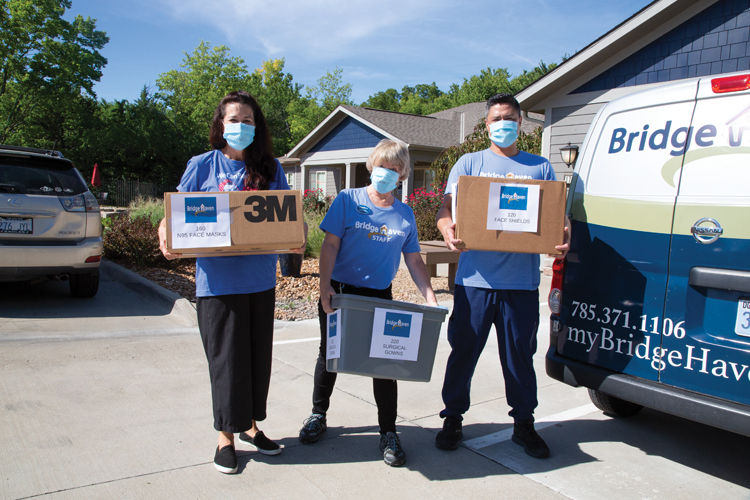
Sarah Randolph, Kimi Ruder & Sean Stubbs distributing new supplies to all its locations
Forging a Path Through Crisis
Theirs isn’t an easy road. The industry was already in crisis thanks to ongoing workforce and funding shortages before the pandemic began, the Kansas Health Care Association, LeadingAge Kansas and Kansas Adult Care Executives said in a joint press release in April. It’s even harder now given that older adults are particularly vulnerable to COVID-19.
Kansas had 543 confirmed cases in skilled-nursing and long-term care homes, and 141 deaths through Aug. 2, according to the Centers for Medicare and Medicaid Services (CMS, part of the U.S. Department of Health and Human Services). In Lawrence, confirmed cases had been reported at the long-term care facility at Lawrence Presbyterian Manor, Brandon Woods at Alvamar and the Pioneer Ridge Health & Rehab nursing facility as of press time.
To keep the virus at bay, administrators must follow guidance not only from the Centers for Disease Control but also CMS, Kansas Department for Aging and Disability Services (a division of the Kansas Department of Health), the Lawrence-Douglas County Health Department and their own medical advisors.
“(Facilities) have all these layers of regulations and requirements that they’re trying to meet and balance,” says Megan Poindexter, executive director of the Senior Resource Center (SRC) for Douglas County.
That balancing act began at Bridge Haven Memory Care in February, when executive director and infection preventionist Sarah Randolph began monitoring COVID-19’s spread. When the facility went into full lockdown on March 12, she and her staff put in long hours scrutinizing every aspect of care. Randolph jokes about eating too much chocolate and not having time to even shower, but she’s serious when talking about her employees’ response. Their effort and creativity—one even designed “bleach boxes” to clean shoes and prevent cross-contamination between buildings—and support from Bridge Haven’s owner have so far forestalled the disease.
“(Robert Wilson Jr.) is committed to doing whatever needs to happen,” Randolph says of the founder and CEO of Bridge Haven, which has only the single facility.
Others appreciate the benefit of larger institutions. Lawrence Presbyterian Manor is owned by Presbyterian Manors of Mid-America, a not-for-profit organization based in Wichita. It has 16 locations and two hospices in Kansas and Missouri, plus a new community under development in Colorado. They’re all in regular contact to discuss regulations and approaches, Jones says.
“We are big enough that we have layers of support and infrastructure,” he explains.
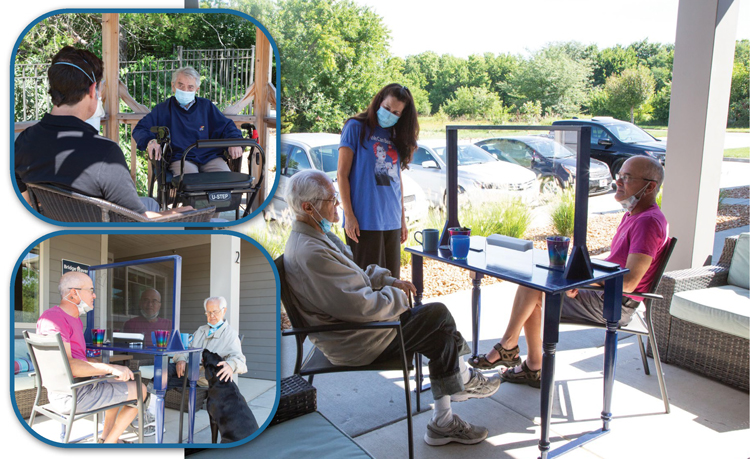
Top left: Bridge Haven resident, Ken Martinez, shares coffee with his physician, Dr. Eric Huerter, in the gazebo, one of his favorite spots on the grounds. Left and above: David Sakumura visits his dad Joe with his dog Pearl as Sarah joins in the conversation
Surviving Shortages
Strategizing in real time as the crisis unfolded was the first hurdle for senior living facilities across the country. Next came sourcing needed supplies. Kaiser Health News reported in June that one-fifth of the country’s 15,000 nursing homes had less than one week’s supply of masks, gowns or other personal protective equipment (PPE) during the last two weeks of May. Cleaning supplies were also hard to come by, Randolph says, and she credits office manager Kimi Ruder with finding it all for Bridge Haven.
“When (the Federal Emergency Management Agency) was telling us they didn’t have any PPE for us, Kimi turned into a one-woman PPE purveyor,” Randolph says.
Ruder sourced hand sanitizer from Kansas City distillery J. Rieger & Co. and made the rounds of Walmart, Costco and Target stores for other supplies.
“My biggest challenge, especially in the early days of this madness, were the limitations,” Ruder explains. “Even if I found a store that had what we needed, we could only buy one.”
She also collaborated with health-care suppliers to stay ahead of local shortages of disposable gloves, alcohol swabs for cleaning surfaces, low-touch thermometers and isolation gowns. Community members sewed reusable cloth masks, and one Good Samaritan even delivered face shields made on his own 3-D printer.
“The donations have been amazing,” says Randolph, who also notes shortages for many items have now eased.
Facilities have taken a financial hit as increased use of PPE and cleaning supplies drove up costs. At the same time, new admissions slowed due to shutdowns. Staffing has also proven a challenge, but not in the way you’d think, Jones says. Turnover has remained normal among Lawrence Presbyterian Manor’s 100 full- and part-time employees. But day-to-day scheduling is sometimes difficult when employees must take time off unexpectedly should they be exposed to the virus outside of their job or feel unwell for any reason.
Then others must fill the gap, Jones says. The director of nursing is covering shifts on the floor, maintenance workers assist with meal deliveries and Jones calls bingo via a conference call system. Exercise sessions have moved to Zoom, daily devotions to Facebook and other activities into the hallways.
“We’ve had to get a little creative with what we’re doing and where we’re doing it,” activities assistant Rebecca Fasching says, who adds some group activities are now done in residents’ doorways so participants can see each other while remaining at least 6 feet apart.
Practicing social distancing and other prevention protocols at home is also important, administrative assistant Ellen Williams says. Any inconvenience is minor compared to what’s at stake.
“Pretty much everyone understands that we’re all taking it day-to-day and doing what we should to keep everybody safe and healthy,” Williams says.
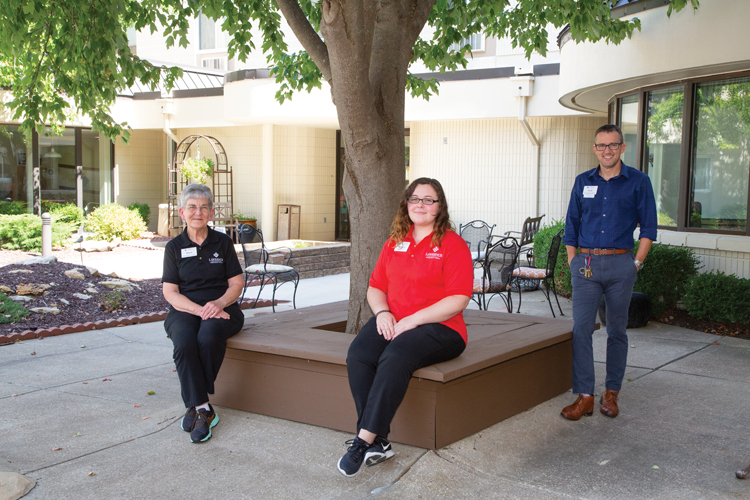
Curtis Jones of Lawrence Presbyterian Manor stands outside the main entrance with Sharon Goger and Rebecca Fashching.
Safety First
It’s still a scary time. A survey conducted by the Service Employees International Union and released in June shows 78 percent of nursing home workers nationwide believe they are risking their lives by going to work each day.
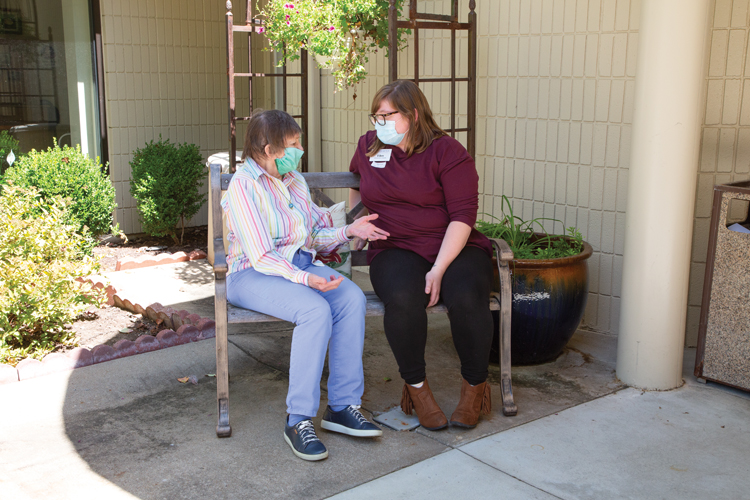
Ellen Williams converses with Lawrence Presbyterian Manor client Beth.
Workers in Lawrence say clear communication from administrators and defined safety protocols have helped them feel more confident. Every employee at Lawrence Presbyterian Manor completes a temperature screening and questionnaire, and washes their hands before starting a shift; and all employees were tested for COVID-19 after the first case was identified in August. Other procedures limit contact and exposure throughout the day. Kitchen workstations are outlined with blue tape to remind everyone of spacing, surfaces are regularly sanitized and meals are delivered to residents instead of being served restaurant-style.
“I feel very safe here in my work environment,” says Goger, who has adopted new habits outside of work like cleaning her car’s steering wheel and changing clothes immediately upon arriving at home.
In fact, the greatest concern expressed by those interviewed for this article was for residents’ well-being. Closing facilities was necessary to help prevent COVID-19’s spread, but the resulting isolation put their emotional health at risk. To offset that, Bridge Haven has implemented a buddy system that pairs staff more directly with residents, has facilitated a letter-writing project and has used technology to connect families.
Bridge Haven focuses solely on memory care, and its campus includes three homes with a dozen residents and 20 staff dedicated to each. Most are universal workers, meaning they provide direct care as well as cook, clean and otherwise engage with residents.
“When I’m not interacting with residents, I’ll do anything,” says Sean Stubbs, one of three house managers who also oversees some operations. He enjoys cooking meals but is equally willing to clean, do laundry or even paint a resident’s nails.
Spending time with them “is important now, especially when they aren’t able to see family,” he says.
The past months have been undeniably stressful for senior care workers, and Bridge Haven strives to show appreciation for its employees. A “heroes” T-shirt proves popular, as have the relaxed dress code and quizzes, contests and giveaways held through its online scheduling system message board, Randolph says. Wilson, the CEO, also boosted morale with a “Christmas in May” bonus. The administration knows it’s a challenging time for everyone, especially those who are also caring for children or aging parents, Ruder adds.
“Sarah’s [Randolph] good about saying, ‘Take care of yourself. You matter,’” she says.
No one quite knows what senior living facilities will face in the coming months. Communication and flexibility remain key, particularly as facilities gradually resume what were once considered “normal” activities, Jones explains. Recognition of the efforts being made by all workers is as essential as the employees themselves, the SRC’s Poindexter adds.
“These people are part of our community, and they’re working really, really, really hard to take care of the people who are most vulnerable to the effects of COVID,” she says. “They’ve been hanging on so tight and [have]been so strong. There’s a level of courage there.”

